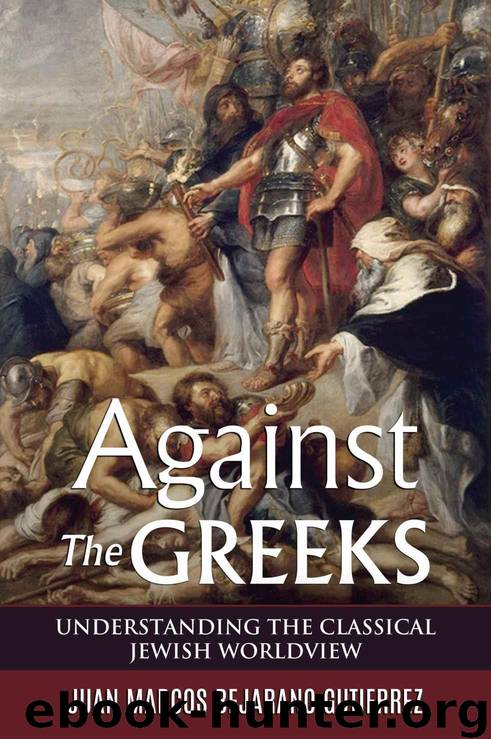Against the Greeks: Understanding the Classical Jewish Worldview by Juan Marcos Bejarano Gutierrez

Author:Juan Marcos Bejarano Gutierrez
Language: eng
Format: azw3
Publisher: Yaron Publishing
Published: 2017-01-01T23:00:00+00:00
Chapter 6
Christianity and Greek Thinking
I t may seem odd to include a chapter on Christianity in a book on Jewish thinking. However, Christianity is inextricably tied to the western Jewish experience. In the medieval period, the relationship was unfortunately often a negative one. The impact of Christian ideas or at least the concern of the rabbis to respond to them was an ever-present need.
Today, especially in the United States, Christians and Jews enjoy a rapport unknown in previous centuries. While most Jews living in western countries do not fear Christian violence, the influence of Christianity on Judaism is strong and remains a concern. As Rabbi Byron Sherwin once noted. Jews in American think about Judaism in Protestant terms. Because of this, I believe including a short chapter on Christianity is critical.
For the average individual, the differences between Judaism and Christianity can be summed up rather simply: Christians believe that Jesus is Israel’s promised Messiah, the Son of God, or even God Himself made flesh and Jews do not. Other than this, Jews and Christians share much in common and reflect the same fundamental faith. After all, they are both monotheistic religions based on the revelatory claims of the Hebrew Bible (i.e., the Old Testament in Christian circles) and teach an ethical, moral lifestyle. Other differences are merely attributable to cultural or linguistic issues.
However, things are not so simple, and while the messianic claims of Jesus are indeed an issue of significant dispute between Jews and Christians, I would venture to say that the critical demarcation between Judaism and Christianity is based more on the fundamental differences that reach the core of each religious tradition. The basis for this idea was a lecture given by Rabbi Byron Sherwin z”l.
In this sense, Jesus is not the dividing factor but rather one aspect of differentiation. Instead, the core issues are related to the fundamental differences between Jewish thinking and non-Jewish thinking, the answer to the question “who are the Jews?” and finally Judaism’s understanding of the Torah as the foundation of God’s relationship with the Jewish people. These areas I contend are the real differences between these two historic monotheistic faiths, rather than the singular focus of who Jesus was or claimed to be.
As a brief note, I should add, that the statements made regarding Christian perspectives throughout this chapter are not intended to minimize the complexity and diversity of thought existent in ancient and modern Christianity. They are instead designed to serve as the basis upon which Jewish reflections regarding the same issues can be addressed and understood. Moreover, the principal concern is to establish Jewish perspectives to the significant issues of discussion.
The difference in thinking is our paramount concern because understanding and developing this idea is critical because how Jews and Christians approach the Bible, life, history, and theology are the by-product of the “philosophical” differences that exist between them. All of the other points of disagreement are ultimately related to this matter. I hope to address them in a separate work.
Download
This site does not store any files on its server. We only index and link to content provided by other sites. Please contact the content providers to delete copyright contents if any and email us, we'll remove relevant links or contents immediately.
| Haggadah | Hasidism |
| History | Holidays |
| Jewish Life | Kabbalah & Mysticism |
| Law | Movements |
| Prayerbooks | Sacred Writings |
| Sermons | Theology |
| Women & Judaism |
The Power of Habit by Charles Duhigg(3130)
Man's Search for Meaning by Viktor E. Frankl(2670)
Mckeown, Greg - Essentialism: The Disciplined Pursuit of Less by Mckeown Greg(2440)
MOSES THE EGYPTIAN by Jan Assmann(2412)
Devil, The by Almond Philip C(2326)
The Complete Dead Sea Scrolls in English (7th Edition) (Penguin Classics) by Geza Vermes(2277)
Unbound by Arlene Stein(2268)
I Capture the Castle by Dodie Smith(2034)
Schindler's Ark by Thomas Keneally(1879)
The Invisible Wall by Harry Bernstein(1799)
The Gnostic Gospel of St. Thomas by Tau Malachi(1794)
The Bible Doesn't Say That by Dr. Joel M. Hoffman(1677)
The Secret Doctrine of the Kabbalah by Leonora Leet(1607)
Political Theology by Carl Schmitt(1579)
The Jewish State by Theodor Herzl(1533)
A History of the Jews by Max I. Dimont(1529)
The Dead Sea Scrolls Bible by Martin G. Abegg(1513)
The Book of Separation by Tova Mirvis(1486)
Oy!: The Ultimate Book of Jewish Jokes by David Minkoff(1369)
